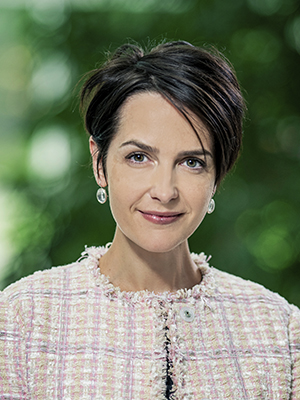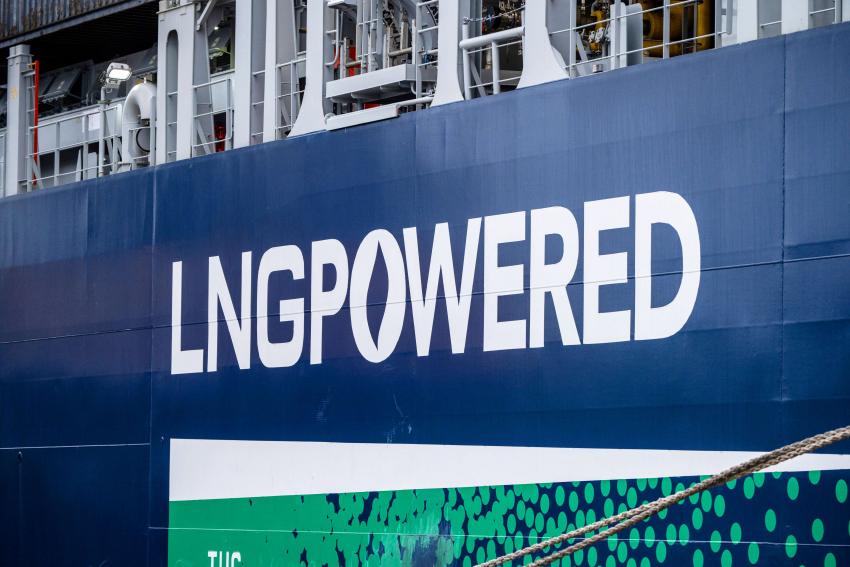At the end of September, the new generation LNG-fuelled container ship CMA CGM TIVOLI was welcomed at the Riga Universal Terminal (RUT) of Port of Riga. It has a dual-fuel propulsion system - both conventional and LNG, significantly reducing harmful emissions into the atmosphere. According to CMA CGM, the dual propulsion reduces sulphur oxide emissions by 99%, nitrogen oxide emissions by 92% and fine particle emissions by 91%. CMA CGM's TIVOLI is the third alternative-fuel vessel to enter the Port of Riga in the last month, highlighting a new trend and bringing the Port of Riga closer to its climate neutrality goal.
The 205-metre-long vessel was built at Hyundai Shipyard in South Korea and joined the fleet of French logistics giant CMA CGM in June 2024. The container ship, which has a maximum capacity of 2,000 TEU (20-foot containers), will now operate on CMA CGM's container line on the route Riga - Teesport - Zeebrugge - Rotterdam - Helsinki - Tallinn.
At the beginning of September, the first cruise vessel powered by renewable energy - TUI Cruises' cruise liner MEIN SCHIFF 7 - made its first call to the Port of Riga. The vessel was commissioned in June this year and is designed to operate using methanol. Furthermore, the world's largest independent container line X-PRESS FEEDERS also started container services on the Green Baltic X-PRESS route from the Port of Riga in September with the freshly built and methanol-powered ECO UMANDE.
“The industry is shifting towards climate neutral operations; process automation, zero emission technologies, decarbonisation and renewable energy initiatives are increasingly gaining ground. European legislation requires all actors in the transport and logistics chain to transition to sustainable business practices, requiring each to identify the environmental impacts of all the companies (customers and suppliers) involved in its chain. And this will happen very soon!” said Ansis Zeltiņš, the Freeport of Riga CEO.
“More alternative fuel ships in the Port of Riga are the first swallows towards climate-neutral transport services, providing a competitive advantage for the port. It is logical - with time more clients - carriers, cargo owners, exporters and importers - will be economically interested in looking for green supply corridors and Riga will be ready to provide such”, added Ansis Zeltiņš.
As we know, until now, commercial ships have been powered mainly by conventional fossil marine fuel (diesel). It is estimated that maritime shipping accounts for close to 3% of all global carbon emissions. To change this situation, the International Maritime Organisation (IMO) has set a target for the entire shipping industry to reach zero emissions by 2050. The European Union has agreed and included the shipping industry in a single Emissions Trading Scheme (ETS), which requires shipping companies to pay for their emissions (emission quotas) from 2024 onwards. At the same time, the FuelEU Maritime Regulation obliges the shipping industry to reduce its carbon emissions by 2% by 2025 compared to 2020 levels.
The only way to meet the ambitious climate targets is to replace the fleet powered by conventional marine fuel with ships using alternative, zero-emission energy. Methanol and LNG engines are already in use, but the industry is exploring other non-fossil fuel options such as hydrogen, ammonia, electricity and nuclear power. In the first half of 2024, 310 new alternative-fuelled ships have been ordered from shipyards worldwide, representing 41% of the total tonnage ordered in the first half of the year.
Information for media

- [email protected], +371 670 308 53
- Freeport of Riga Authority
- 12 Kalpaka blvd, Riga, Latvia, LV-1010
 English
English























